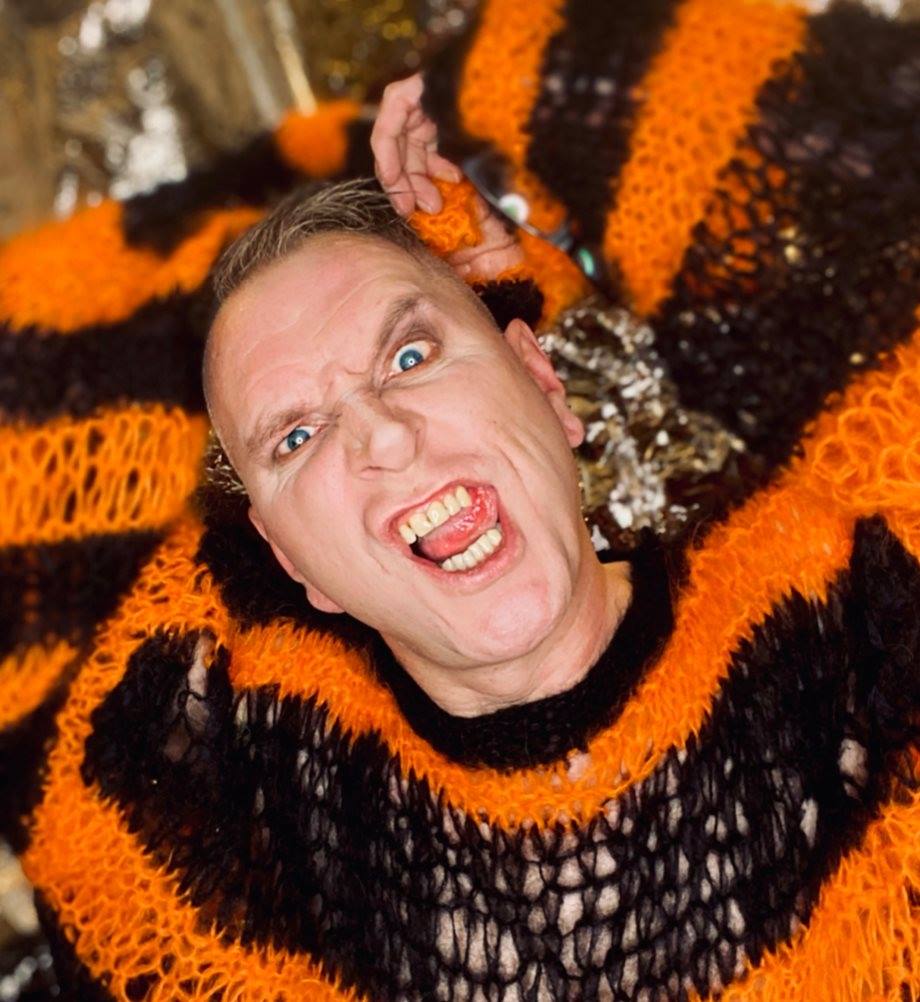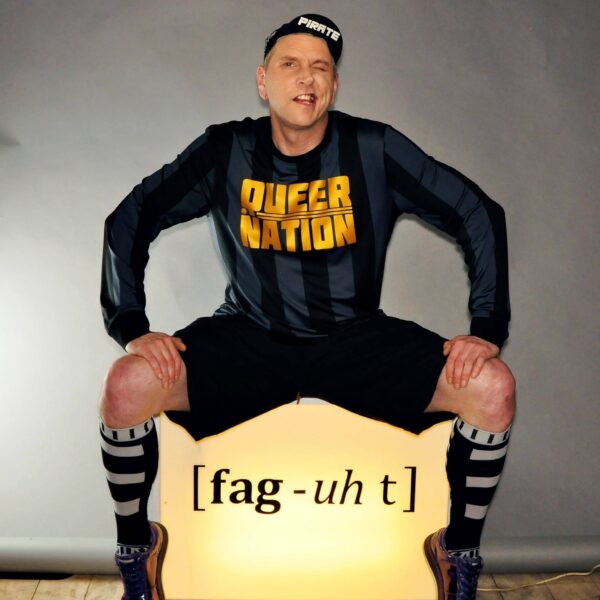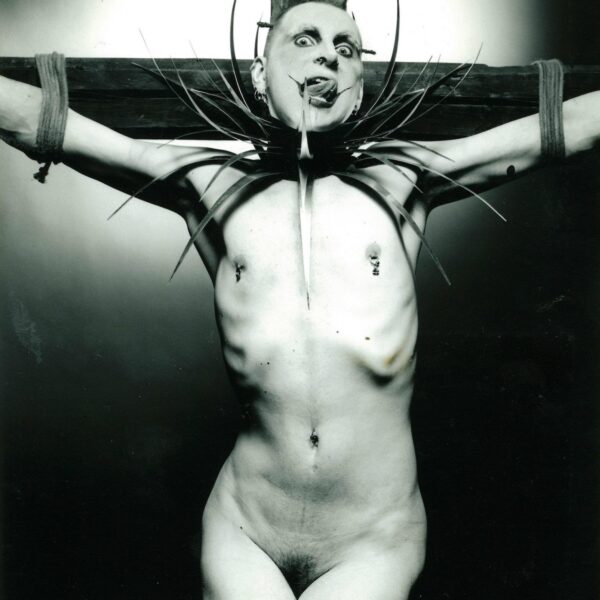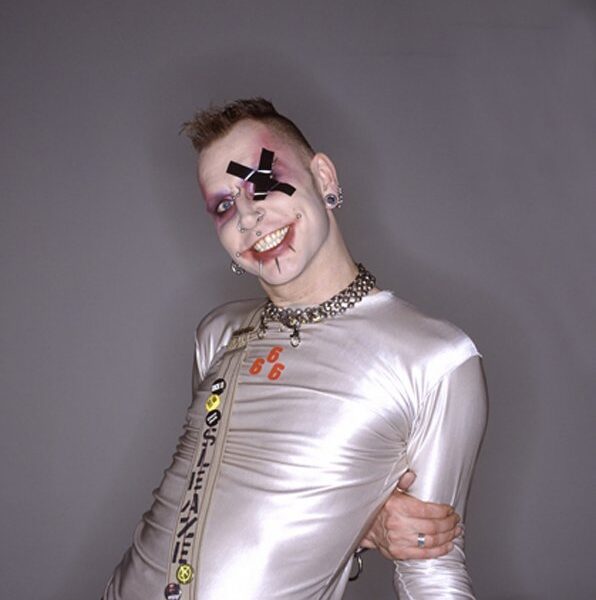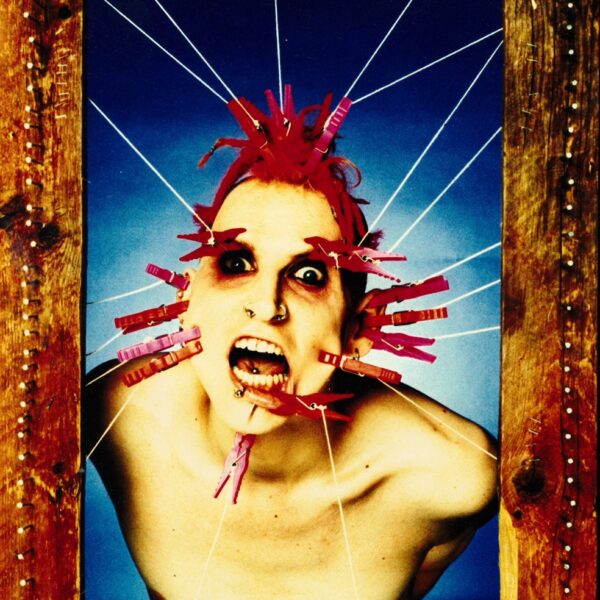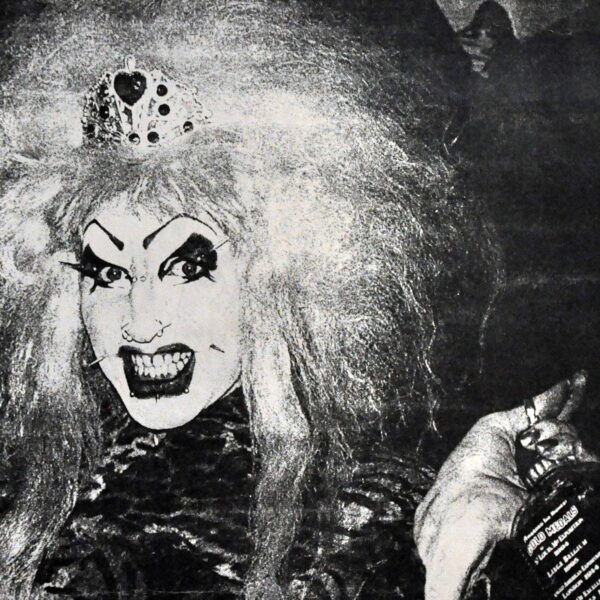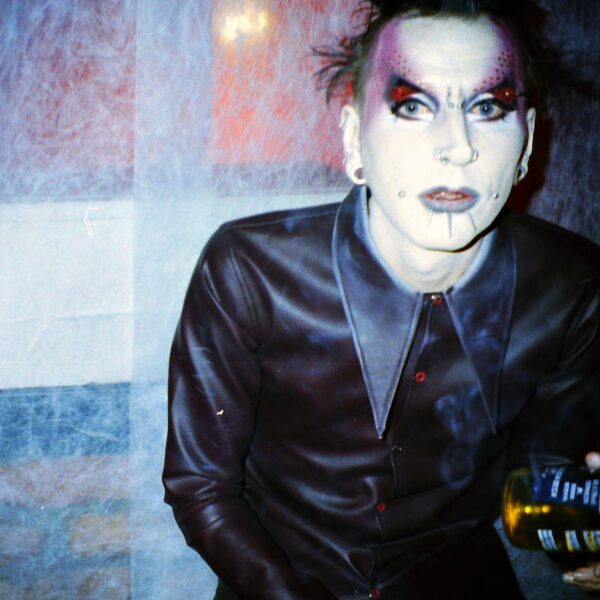We discuss safe zones, being provocative, Oslo’s queer scene, everything about satan and sex, and the legacy he leaves behind, as Deadswan bows out of the DJ booth.
Reidar Engesbak is the absolute anathema to every pearl clutching conservative out there. He is a queer artist that has re-appropriated every stigma middle-establishment could throw at him and co-opted it in a provocative creation that is part politics, part performance, and consumes every fibre of his being. It imbues his many different guises; Deadswan the DJ, Enegesbak the journalist, Reidar Deadswan, the eternal club kid, and when we go further back, Genitalia and Sadomaoistan too.
For over thirty years, he’s been a pillar of non-conformity on Oslo’s queer scene (although he’s originally from Bergen) with some confluence between the extended LGBTQI+++ and DJ scene, pre-dating even some of Oslo’s most established selectors. His club nights Strictly Kinky and Iconoclastic, live on in infamy today, while his progressive politics continue to find an outlet through the written word as one of the leading voices of Norway’s LGBTQI++ magazine, Blikk. At the height of his notoriety, performances as part of Genitalia shocked and caused outrage as he and his peers paved the way for the next generation of queer people.
At the heart of all these different projects that Deadswan’s created over the years is something that is “always sex positive and always very queer” and in terms of music this would be captured in “dirty samples and raunchy sex stuff” and include “everything that is about satan and sex.”
Strictly Kinky would give queer people their first space in Oslo; Iconoclastic would brandish banners admonishing any form of facism; while Genitalia would rebuke any form of homophobia. In one of Genitalia’s most notorious exploits, they doused Eurovision star and “pray-the-gay-away” advocate Carola in beer during their performance at Rockefeller. The incident caused quite the furrore, leading Reider to write an op-ed piece explaining the group’s actions through Blikk, incidentally laying the foundation for a career in journalism through those very pages.
Today he’s one of the elder statesmen of the scene and he’s more likely to start a conversation than cover an unsuspecting audience in blood (more on that later). While by his own account he has “mellowed” with age, he remains politically active and continues to be a visceral voice and face on the leading edge of the queer scene. His provocations have tempered with sobriety and married life and in his husband – “who’s handled so many of my quirks” – he’s also found “a rock”. And with this new clarity in his life, he’s decided that there will no longer be any Deadswan to direct some of his energies in the future.
As of the 1st of July 2023 during a DJ appearance for Olle Abstract’s LYD, Deadswan will be laid to rest, the final swan song and a celebration of one of the most thought-provoking and exciting DJs to emerge from Oslo. Why is he choosing to bring it to an end now? I met up with Reidar over a reserved coffee to talk about this and the impressive career and legacy he leaves behind as he retires the moniker.
Deadswan: Let’s get one thing straight. I’m hopeless when it comes to years and you know, remembering. So we have to wing it.
Mischa: That’s fine because what I want to start off with was something recent; the fact that you’re stopping Djing. Why?
Deadswan: I don’t know. I’m at this place in my life where… Okay, this is what my therapist said: “You need to find out who you are without the DJ thing.” When I get invites, it’s always as Reidar Deadswan. I think I’ve felt kind of trapped in working this face on the gay scene. So I’m trying to figure out what I’m going to do.
Mischa: And what’s that?
Deadswan: Move out of the city. We have a house in the country. I really liked my own company. I’m not afraid to be alone.
Mischa: Earlier, you talked about being provocative. Have you always been provocative; even as a kid growing up in Bergen?
Deadswan: When I was growing up at school they tried to bully me, but you can’t bully me because I always knew that I was different. Every week on Fridays for instance, we had this class hour where you could bring music and play it to the classroom. I always had to play last, because then the rest of the kids could leave. It was just me and the teacher playing new wave. They didn’t get me at all. The teacher got me.
Mischa: Was music an important part of being provocative right from the beginning?
Deadswan: Yes, I remember when I discovered Soft Cell. That was an eye-opener for me. That’s always been my group.
Mischa: From the first album, the Non-Stop Erotic Cabaret?
Deadswan: Yeah, that one and before that it was Adam and the Ants. I went on a school trip to Oslo and they had this shop in Grensen; where they sold t-shirts and bondage gear and stuff. I came home with an Adam and the Ants t-shirt with bondage imagery, and my mother was like,” what?” I wore that to school and my bedroom walls were full of Adam and the Ants and then Soft Cell.
Mischa: Tainted Love would have been huge, though. That was in the charts.
Deadswan: Oh, yes. It was a huge success. People write them off as they were one hit wonder but they had hits. I mean it was really memorabilia and non-stop erotic dancing – which is picked to be the first ecstasy record – I never heard anything like it.
Mischa: So when you are playing this kind of stuff to the kids in the school, even tracks we consider hits today, they still thought it was weird?
Deadswan: They didn’t understand anything.
Mischa: Following these acts, were you just listening to the music or were you also trying to emulate them in terms of how they presented themselves, like what they were wearing?
Deadswan: Yes, I went to school with my homemade bondage trousers, based on Adam Ant. You know, obsessed!
Mischa: At what point do you think like; okay, I’m playing all this music. Let me try and put it together as a DJ set.
Deadswan:That was when I moved to Oslo. Because when I moved to Oslo, I got involved with queer activism, and we had this group called the pink rebels. We were running around at night, spray painting walls and having demonstrations.
And then we started taking over London pub (Oslo). One of the guys who worked there, who was also in pink rebels, got the opportunity to use the back room. It was an empty space so we got to make our own club there, called Shame Club. That’s where I started DJing.
That was during the whole Madchester wave. So, it’s Stone Roses, Happy Mondays and British dance music like S’ Express, but of course Georgio Moroder, Donna Summer, Sylvester.
Mischa: Was there a big scene in Oslo for that kind of music back then?
Deadswan: No, we were one of the first places to play Acid and British Dance, but I always mixed it up with stuff like Deutsche American Freundschaft, Nitzer Ebb and Front 242.
Mischa: Was there a bit of a queer scene happening in Oslo at that time?
Deadswan: No queer scene. It was just the gays. Even there, we were the weird ones, we were the queers and they were the gays.
So then we started Strictly Kinky. Trying to cater to the more alternative crowd, but without sexuality being the main issue. So, we knocked on So What’s (where jaeger is today) doors.
They were really reluctant. Because we had already started this group called Genitalia, which was doing performances. So they were like, “we’re not sure if this fits here,” but we were regulars so they knew us.
They gave us a Sunday during Christmas and we redecorated the whole club. We built a huge vagina that you had to walk through, which we could never do today because he was made of plastic. If there had been a fire we would all perish. (laughs). We covered the walls in anime japanese porn.We made a real fetish club and people who dressed up got in for free. There were strictly no photographs allowed and we had performances, like a guy in the corner polishing boots.
Mischa: It sounds like a torture garden.
Deadswan: Yeah, it was absolutely based on torture garden and it was a success. So What started giving us more dates, not like proper Fridays or Saturdays because it was still too alternative. But eventually, they saw that we could pull the crowd, and then we got very big headed.
So we thought; “Let’s take this back to Bergen.” We rented a big pink bus and called it, “The magical Oompa Lumpa tour.” We filled it with freaks and drugs and went over to Bergen, where my parents were sitting on a patio looking down with a glass of white wine watching the freak show unfurl.
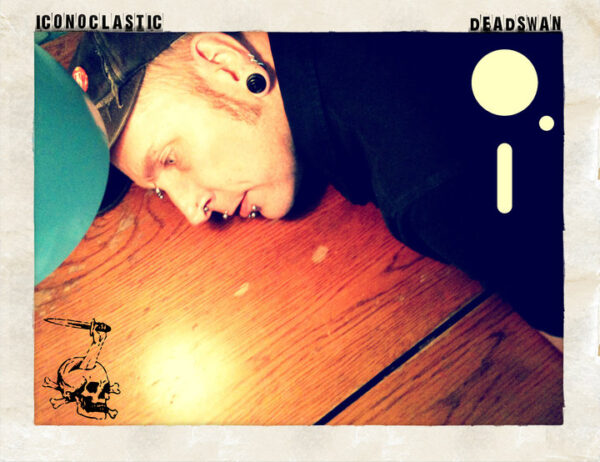
Mischa: At what point do you start doing the iconoclastic stuff?
Deadswan: When So What closed we moved Strictly Kinky over to Kraftwerk, with Chris Lynch. And then after a while Little Wolf came along, So then that’s when we started, Iconoclastic. And then we moved it to Kill Your Ego.
Mischa: Was it a continuation of Strictly Kinky?
Deadswan: No, it was separate, it became more about the DJ.
Mischa: This would have been around the time, or even before the time of our Electroclash became popular?
Deadswan: Yes, it kind of co-emerged.
Mischa : There was something in the air where people got tired of House and Techno. Did you go through the same thing?
Deadswan: I didn’t get tired of it. It was more about looking backwards and finding the more obscure electronic sounds and movies. Liquid Sky was a huge inspiration for being weird and alienated, you know. It was kind of tongue in cheek, but electroclash was still really frowned upon.
Mischa: Is that the kind of DJ style you always liked and preferred?
Deadswan: Yes, I didn’t beatmix at all.
Mischa: When did that start?
Deadswan: It started at Kill Your Ego, when I started playing with Lynch and Little Wolf, because they are really turntablist. I hung out there after hours iust playing and mixing and recording every night. I could never beat mix on vinyl though. I have a huge library of CDs, and I’m not sure what I’m gonna do with it after Deadswan. (laughs)
Mischa: At the same time you were doing Iconoclastic in Oslo, we also had parties all around the world, especially in London, doing similar things, like Erol Alkan’s Trash. Was something in the air at that time for you?
Deadswan: Yeah, We travelled to Nag-Nag a lot. I got to know Johnny Slut and Fil OK. Which was amazing because they were doing the same thing as we were doing. But the thing that differed Nag-Nag in London to Iconoclastic was everyone was speeding their tits off in Oslo. We brought over Princess Julia and we brought over War Boy and they were just shocked by the amount of drugs in Oslo. There was a kind of punk energy in the clubbing here.
Mischa: That reminds me of what you talked about earlier Genitalia. There was a very punk element to the performances that somehow also found its way on national TV. From what I saw in a Youtube clip it was something like Club Kids doing sesame street. How did that happen?
Deadswan: We got this call from NRK and they said you want to come on an audition and I was like, no, I don’t want to be on national television. But we got there and dressed up like we used to, and we said: “If we’re going to do this, we have to do it our way.” I mean, they’re really strict, but they bent the rules for us. We did it for a year or something every Thursday.
Mischa: What was the theme?
Deadswan: The theme was trend. We got sex-exploitation movies that we reviewed on air. We showed clips and then we talked over them. Describing what we were seeing and stuff. It was really trashy. It was kind of a talk show. Tongue and cheek, absurd.
We got these really weird fan letters from jail from a guy who watched us religiously. He had this business idea that he would go to Germany and dig up all Nazi skulls and make them into piss pots and go to Israel to sell them.
I put this letter on facebook many years later and somehow that post ended up with this guy. So he sent me a message and befriended me. (laughs)
Mischa: Did he end up creating his business?
Deadswan: No, he didn’t. He had some issues, but he came out on the right side.
Mischa: Genitalia was a performance group, first and foremost however, was there a musical component to it?
Deadswan: Well, we got a record contract, and the guy who ran the record company also wanted to be our manager, and we were like; “what? This is weird”. We didn’t end up doing that.
Mischa: But you did end up in a musical group, Sadomaoistan.
Deadswan: Yeah. But that was just the performance part.
Mischa. And what did that entail?
Deadswan: Things like cutting ourselves… On one occasion, I got this cleaning bill from Rockefeller because of that. Genitalia were Siamese twins, so we had these corsets joining us. And then we just got out our razors and started cutting each other.
This was at an AIDS benefit. Because we thought, “What’s the most scary thing that queers can experience?” Yes, sperm and blood! Nobody got it. We had such fun, but backstage was just full of blood so we had to pay for that.
I have this great picture of me with all the cuts. And then the photographer was “just one more, just one more” and I fainted.
Mischa: And what did the organisers say, they were not happy?
Deadswan: No. It was the same when we went to euro pride in Copenhagen. We were booked on the main stage and pride had become such a corporate thing. So we thought “let’s do something provocative.” The vocalist ate a lot of chilli con carne. And at the end of the show, we attacked him and – I’m not sure what we put into his mouth – but when he had to vomit, he vomited a rainbow flag.
The organisers came and took our badges, and ordered us to leave and “don’t come back!” We were always kind of more queer than gay. And we wanted to challenge the whole idea of this gay community thing. Sometimes with intentions and sometimes just for fun.
Mischa: I think people like you probably paved the way for a lot of what’s happening now especially in terms of being queer and being a DJ, but at the same time that kind of thing would not fly these days.
Deadswan: Yeah. The thing is, now, it’s all about safe spaces, you know. Everyone has this list of things you’re not allowed to do and we never had that. If we had any trouble, we had to deal with it. And I’m kind of worried that people are lulling themselves into this safe zone thing. There is no such thing as a safe space. You have to maintain it.
I think everybody should be woke, I can’t see the problem with that. If you have these kinds of strict rules; no homophobia, no transphobia, no racism, no sexism, you have to consider how you deal with it if it occurs. That’s where you have to have the focus.
Mischa: Although you were in Sadomaoistan, you never tried your hand at music?
Deadswan: No, I had always been a fan. I tried to go into the studio, but sitting listening to the same sound bites over and over and tweaking just bores the shit out of me. I always think that the best music has been made or someone is sitting making it now so i’m gonna discover it eventually.
Mischa: Do you feel like the music that you played had to be an expression of who you are?
Deadswan: Yeah. That’s why I always loved everything with dirty samples and raunchy sex stuff.
Mischa: What are you playing these days?
Deadswan: Yeah, that’s a question. I don’t want to say Deep House but I mean, I like epic, K-hole, tunnel stuff. I really like (I can’t say this,) Nina Kravitz. I mean what the fuck happened to her? I don’t understand but I really like her. I think it’s really hard to pinpoint what I play. I go back and forth.
Mischa: Is there any period that stands out for you in terms of Djing?
Deadswan: Iconoclastic. Because we mixed everything up from, a-ha to Plastic Bertrand to Leila K to Kraftwerk. I remember DMX Krew was booked at Kill Your Ego. He played upstairs, and we had Iconoclastic in the atrium. He was just standing there looking up at us, and he was just; “what the fuck is this?” He did not get it at all. I think he came when we played “I’ve been losing” you by a-ha.
Then I wasn’t limited to beat mixing. But once you start beat-mixing, it’s really hard to get out of that loop. I was much more free when I didn’t beat mix. And then it becomes kind of like, you don’t want to fuck it up. So, I think that’s the drawback.
Mischa: That brings me back to why you’re not DJing anymore. Is that part of the reason?
Deadswan: I’m not into the party scene anymore. Everything goes in at 140 bpm now.
Mischa: I thought 140 BPM would have suited you?
Deadswan: Well, it’s the same as getting into black metal, if you really dive into it, you find the piece in there. And I guess that’s the same with the Techno that’s being played now, but I’m not really invested.
Mischa: That’s interesting. Because I thought this would have been the perfect time for a character like Deadswan to exist.
Deadswan: Yeah. Well you know like bands they always do come back so you never know, I just want to go out without this. I want to focus on other stuff.

